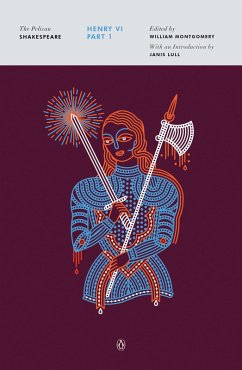
The Lost Letters of William Shakespeare (eBook, ePUB)
The Undiscovered Diary of His Strange Eventful Life and Loves
Versandkostenfrei!
Sofort per Download lieferbar
7,99 €
inkl. MwSt.
Weitere Ausgaben:

PAYBACK Punkte
4 °P sammeln!
Could a treasure trove of 400-year-old letters constitute a previously unknown "diary" written by William Shakespeare? After 25 years of research, I believe the astonishing answer is yes. The Lost Letters of William Shakespeare: The Undiscovered Diary of his Strange Eventful Life and Loves reveal vibrant details from Shakespeare's arrival in London to the premiere of Titus Andronicus, his first play to be staged, along with political commentary on Elizabethan England (and surprising insight into how it affects us today); and a magnificent, but tragic, love story.In 1989, I performed a one-man ...
Could a treasure trove of 400-year-old letters constitute a previously unknown "diary" written by William Shakespeare? After 25 years of research, I believe the astonishing answer is yes. The Lost Letters of William Shakespeare: The Undiscovered Diary of his Strange Eventful Life and Loves reveal vibrant details from Shakespeare's arrival in London to the premiere of Titus Andronicus, his first play to be staged, along with political commentary on Elizabethan England (and surprising insight into how it affects us today); and a magnificent, but tragic, love story.
In 1989, I performed a one-man play about the life of William Shakespeare in London. "Miss B," an elderly woman was apparently sufficiently impressed by my impersonation of the Bard that she offered to show me some old, never-published letters that she believed were written by William Shakespeare. Although I was initially skeptical, it was an offer too good to pass up. What I discovered in these letters began to unravel almost everything I thought I knew about the great poet and playwright. My Prologue to The Lost Letters describes our meetings, more about my mysterious benefactor, and how - throughout my subsequent careers in business and public service - I spent over two decades decoding and researching what these letters had to say, in order to adapt this true story for the modern reader.
Through the letters, we learn that Shakespeare left home in 1586 as a jack-of-all-trades for a troupe of traveling players. His goal was to reach London and then sail to America in the hope of restoring his family's honor and finances. He wrote letters addressed to his friend John Combe, intending them as a record of his journey and his thoughts and feelings, so that his son, Hamnet (two years old in 1586) would know his father, in the event Shakespeare was unable to return to England. Because Shakespeare wanted to "report his cause aright," his letters are remarkably detailed and intimate. The Lost Letters uncover the truth about the earliest pilgrims to America and reveal that Shakespeare was kept closer to home, in part to fight in a pivotal battle for England against Spain. The Lost Letters also reveal his epic and tragic love affair with the young, beautiful Rosalind.
Although Shakespeare's son Hamnet never apparently saw these letters (and Shakespeare did return home without ever setting foot in North America), we are the beneficiaries of his observations of life in Elizabethan England. The Lost Letters reveal first-hand secrets about the rulers of the land (and those who sought to rule); secrets about Shakespeare's participation in the war with Spain (a war that changed history); bitter truths about Shakespeare's father, his wife Anne, and his patrons; and a heroic lady loved and lost.
Overall, these remarkable letters represent a wealth of as-yet-undiscovered knowledge about Shakespeare's relationships, personality, and career as he carved out his place in the chaotic world of 16th-century London. Whether you are a Shakespeare scholar, merely a fan, or even if you have never read any of his works, the stories of the The Lost Letters will enthrall you with their fascinating and true tale.
Terry Tamminen
In 1989, I performed a one-man play about the life of William Shakespeare in London. "Miss B," an elderly woman was apparently sufficiently impressed by my impersonation of the Bard that she offered to show me some old, never-published letters that she believed were written by William Shakespeare. Although I was initially skeptical, it was an offer too good to pass up. What I discovered in these letters began to unravel almost everything I thought I knew about the great poet and playwright. My Prologue to The Lost Letters describes our meetings, more about my mysterious benefactor, and how - throughout my subsequent careers in business and public service - I spent over two decades decoding and researching what these letters had to say, in order to adapt this true story for the modern reader.
Through the letters, we learn that Shakespeare left home in 1586 as a jack-of-all-trades for a troupe of traveling players. His goal was to reach London and then sail to America in the hope of restoring his family's honor and finances. He wrote letters addressed to his friend John Combe, intending them as a record of his journey and his thoughts and feelings, so that his son, Hamnet (two years old in 1586) would know his father, in the event Shakespeare was unable to return to England. Because Shakespeare wanted to "report his cause aright," his letters are remarkably detailed and intimate. The Lost Letters uncover the truth about the earliest pilgrims to America and reveal that Shakespeare was kept closer to home, in part to fight in a pivotal battle for England against Spain. The Lost Letters also reveal his epic and tragic love affair with the young, beautiful Rosalind.
Although Shakespeare's son Hamnet never apparently saw these letters (and Shakespeare did return home without ever setting foot in North America), we are the beneficiaries of his observations of life in Elizabethan England. The Lost Letters reveal first-hand secrets about the rulers of the land (and those who sought to rule); secrets about Shakespeare's participation in the war with Spain (a war that changed history); bitter truths about Shakespeare's father, his wife Anne, and his patrons; and a heroic lady loved and lost.
Overall, these remarkable letters represent a wealth of as-yet-undiscovered knowledge about Shakespeare's relationships, personality, and career as he carved out his place in the chaotic world of 16th-century London. Whether you are a Shakespeare scholar, merely a fan, or even if you have never read any of his works, the stories of the The Lost Letters will enthrall you with their fascinating and true tale.
Terry Tamminen
Dieser Download kann aus rechtlichen Gründen nur mit Rechnungsadresse in A, D ausgeliefert werden.













